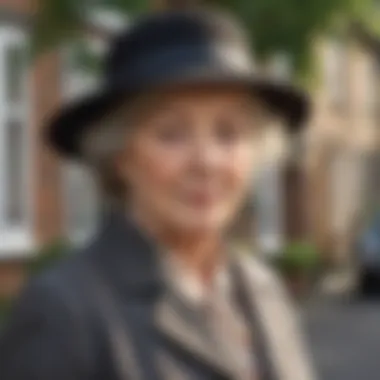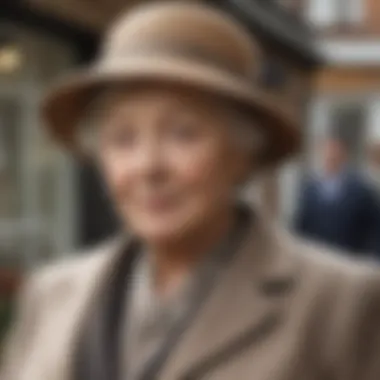Exploring the Legacy of Marple Movies


Intro
Agatha Christie's Miss Marple remains an iconic figure in the mystery genre. Her character has been adapted into various films and television shows, each interpreting her sleuthing skills and the intricate puzzles she unravels. The evolution of these adaptations offers insight into changing audience perceptions and cultural sensibilities. This article aims to analyze these aspects, delving into the world of Marple adaptations and their impact on the crime drama landscape.
Overview of Cinema/TV Shows
The cinematic and television portrayals of Miss Marple have continually evolved. They reflect not only the narrative depth of Christie's works but also the changing dynamics of filmmaking and audience expectations. From the early adaptations in the mid-20th century to the modern interpretations, various elements underscore the relevance and popularity of Marple films today.
Latest Updates and News
Recently, discussions around future adaptations of Marple have gained traction. With a resurgence in interest for classic mystery, the entertainment industry is exploring new takes on the beloved character. Reports suggest that established streaming services are eyeing Miss Marple as a potential series, indicating a strategic shift towards nostalgic beloved narratives.
Trends and Popularity
Marple’s popularity has led to a blend of traditional and contemporary themes appearing in new adaptations. The use of modern storytelling devices has breathed fresh life into the narratives, making them appealing to both long-time fans and newer audiences. Many viewers appreciate how new adaptations intertwine classic elements with contemporary social issues, enriching the viewing experience.
Releases and Announcements
Upcoming projects are being announced frequently. The anticipation surrounding these adaptations highlights a revival interest in classic whodunits. A renewed focus on diversity in casting and storytelling is also becoming apparent, suggesting a forward-thinking approach.
In-Depth Analysis
Plot Summary and Analysis
Marple stories often revolve around a murder mystery in a quaint village, where secrets lurk beneath the surface. Several adaptations have skillfully retained Christie's intricate plots, blending suspense with rich character exploration.
Character Development
Miss Marple’s character is multi-faceted. She is perceptive and intuitive, embodying the wisdom of a sharp observer. Various adaptations have allowed actors to shed light on different dimensions of her personality, ranging from her love for community to her astute deductive skills.
Setting and Cinematography
The scenic village settings are crucial to Marple narratives. Cinematography often captures the juxtaposition between the idyllic surroundings and the darker undertones of the mysteries. These visuals enhance the tension and intrigue surrounding each story.
Behind the Scenes
Interviews with Cast and Crew
Hearing from actors and directors provides valuable insights into the adaptation process. Their perspectives often reveal the challenges and creative decisions made during filming. These narratives contribute to a deeper understanding of how Miss Marple's character maintains her relevance.
Development Process
The behind-the-scenes development of each adaptation is an intricate journey. Scriptwriters dissect Christie's novels, Aim to ensure that core themes are retained while bringing in modern elements. This balancing act is key to appealing to today’s audience.
Reviews and Recommendations
Critic Reviews and Ratings
Critics have often praised adaptations for their loyalty to the source material. However, some reviews note that certain interpretations may stray too far from Christie's original message. These critiques can offer valuable insights for viewers considering which adaptations to watch.
User Reviews and Comments
Viewers’ feedback provides a pulse on the adaptations' reception. Many fans comment on their emotional connections with various portrayals of Miss Marple, underlining the character's ability to resonate with diverse audiences.
Recommendation Lists


- Top Picks:
- Hidden Gems:
- Murder, She Said (1961)
- Miss Marple: The Moving Finger (1985)
- Miss Marple: At Bertram's Hotel (1960)
- Murder Ahoy (1964)
With deeper analysis of the films, we can understand the nuances that enrich Marple’s narrative. The enduring popularity of these films underscores a cultural archetype that continues to intrigue audiences.
Foreword to Marple Movies
Understanding the world of Marple movies is essential for any film enthusiast or aficionado of mystery cinema. These films are not merely adaptations of Agatha Christie's stories; they are a unique blend of character depth, intricate plotting, and social commentary. The significance of these adaptations transcends mere entertainment, resonating with audiences on multiple levels.
In this article, we will explore the various aspects of Marple movies, beginning with what defines the genre. This exploration covers key themes involving female detectives and the broader implications within society. Additionally, a historical context will shed light on the evolution of Miss Marple as a character, reflecting changing societal norms.
Through a methodical examination of cinematic techniques, notable adaptations, and audience reception, we can unravel how these films maintain their charm and continue to engage viewers today. Despite being rooted in a specific time period, the narratives often carry timeless lessons about morality and justice, making them relevant in modern storytelling.
This section sets the foundation for our comprehensive analysis. We will delve deeper into defining the Marple genre and unpack the historical context behind Miss Marple, enabling a greater appreciation of these iconic films.
Defining the Marple Genre
The Marple genre, while distinct, is influenced by various elements of mystery and crime storytelling. At its core, the genre revolves around Miss Marple, a character originating from Agatha Christie's novels, who appears as an amateur sleuth in a variety of complex murder investigations. The formula typically features a quaint English setting, a closed circle of suspects, and, uniquely, a focus on the psychological motivation behind crime rather than the brute force often found in traditional detective narratives.
Key characteristics include:
- Amateur Protagonist: Miss Marple, unlike police detectives, often relies on her keen observation and understanding of human nature to solve mysteries.
- Societal Reflection: The stories frequently explore social dynamics within communities, showcasing various character archetypes to emphasize different societal issues.
- Underlying Themes: Themes of justice, morality, and retribution often surface, making these films not only thrilling but thought-provoking.
This genre's richness lies in its ability to engage viewers intellectually while providing entertainment, making it a staple in mystery cinema.
Historical Context of Miss Marple
Miss Marple first appeared in Agatha Christie’s The Murder at the Vicarage in 1930. Her character was crafted during a transformative period in British society. The early 20th century was marked by shifts in gender roles, post-war recovery, and the rise of the middle class. Miss Marple emerged as a reflection of these changing times—an ordinary woman capable of solving extraordinary problems through insight rather than authority.
Interestingly, she also symbolizes the changing perception of women in society. In a world often dominated by male detectives, Miss Marple stands out with her independent spirit, highlighting the capabilities of women beyond traditional roles. This historical context enriches her character and amplifies her significance in the genre.
Over the decades, her portrayal has adapted to reflect contemporary values, maintaining relevance in a rapidly changing world. This evolution mirrors the broader transformations in society, making Miss Marple not just a character in a story, but a cultural icon whose legacy continues to shape the genre. The following sections will further unpack these themes and characteristics, providing a comprehensive understanding of Marple movies' intricate fabric.
Key Themes and Motifs
Exploring the key themes and motifs in Marple movies reveals the underlying elements that contribute to their enduring appeal. These films frequently challenge societal norms and offer nuanced portrayals of complex characters. Understanding these themes adds depth to the viewing experience and highlights the intricate ways in which they mirror real-world issues.
The Role of Female Detectives
In Marple films, the character of Miss Marple serves as a crucial representation of female detectives within the genre. Her intelligence and intuition are fundamental to solving mysteries, showcasing a unique perspective often overlooked in traditional detective narratives. Miss Marple embodies the idea that profound investigative abilities do not rely solely on physical prowess. She utilizes keen observation and psychological insights to unravel intricate plots and uncover hidden truths.
The contributions of female detectives in these films extend beyond mere plot devices; they signify shifting gender roles within the broader context of society. As viewers engage with Miss Marple, they witness the evolution of women's roles in the detective genre, from passive observers to empowered protagonists taking charge of their destinies. This thematic shift reflects larger societal changes, opening discussions about women's empowerment and their place in traditionally male-dominated fields.
Miss Marple's success in solving crimes subtly challenges stereotypes. Her methods may seem simple, yet they reveal a profound understanding of human nature. This analytical approach highlights how emotional intelligence can be as valuable as physical strength or formal training in investigation. Thus, the role of female detectives in Marple films transcends plot intricacies; it also fosters a critique of gender roles, encouraging audiences to reevaluate existing stereotypes about women in criminal justice.
Social Commentary through Mystery
Marple movies often serve as vessels for social commentary, weaving critical reflections on contemporary issues through the fabric of mystery. The intricate plots, while engaging, provide layers of meaning that prompt viewers to consider the implications of the narrative beyond entertainment. Through careful analysis of these movies, one can identify various societal critiques embedded within the crime-solving scenarios.
Through the eyes of Miss Marple, audiences observe a microcosm of society, revealing the underlying tensions and moral complexities that govern human interactions. The portrayal of crime often mirrors societal fears, with unresolved tensions emerging in the form of murder or deceit. The films address the impacts of class, power dynamics, and social expectations, all of which shape the characters’ motivations and actions.
For instance, crimes in these narratives often reveal deeper societal issues, such as class divide or gender inequality. Characters are not merely perpetrators or victims; they embody the societal structures that facilitate crime. This duality allows viewers to recognize the broader contexts that perpetuate injustices, encouraging dialogues about these themes in real life.
Notable Film Adaptations


The exploration of notable film adaptations is crucial to understanding the impact and evolution of Miss Marple in cinema. These adaptations serve not only as a reflection of Agatha Christie's original works but also play a significant role in shaping public perception of the character. Through different time periods, adaptations have taken varied approaches, giving insights into changing societal values and cinematic techniques. The influence of these adaptations can be seen in their ability to attract diverse audiences. Furthermore, they highlight the adaptability of the mystery genre and its relevance in storytelling today.
Classic Adaptations: A Retrospective
Classic adaptations of Miss Marple can be regarded as cornerstones in the history of mystery films. Joan Hickson, who portrayed Miss Marple in the BBC adaptations during the 1980s and 1990s, is often considered the definitive version of the character. Her performance brought a distinct authenticity to Miss Marple, perfectly embodying the keen observation and piercing insight that define the character.
These adaptations not only respected the nuances of Christie's text but also offered a faithful representation of the socio-cultural context of the time. The era they were produced in allowed for a rich development of supporting characters and plots while maintaining a focus on Miss Marple's investigative prowess. As a viewer, one can appreciate the meticulous attention to period detail, which adds depth to the stories.
"The Miss Marple adaptations have a way of living on, influencing new generations of filmmakers and actors, serving not only to entertain but also to inspire."
Modern Interpretations
Modern interpretations of Miss Marple have taken a slightly different approach, often infusing contemporary issues and sensibilities into the narratives. Angela Lansbury, who starred in the short-lived Murder, She Wrote television series, offered a unique flavor to the character. Though her portrayal diverged from the original spirit of the books, it succeeded in engaging new audiences through its charm and wit.
Recent adaptations emphasize a more diverse representation, exploring themes such as feminism and social inequality. These new portrayals prioritize dynamic storytelling and character development. They integrate modern cinematic techniques, such as innovative editing styles and visual storytelling, to keep pace with current audience expectations.
In summary, while the classic adaptations pay homage to original narratives, modern interpretations push boundaries, all the while continuously revitalizing interest in Miss Marple’s world. This blend of old and new enables the character to remain relevant within the framework of modern cinema.
Character Analysis of Miss Marple
The character analysis of Miss Marple is essential to understanding the depth and appeal of Marple movies. Miss Marple, created by Agatha Christie, is more than just a detective; she is a composite of the collective suspicions and societal norms of her time. Her significance lies in how she embodies the complexities of human nature and morality, as she navigates detectives in a world filled wtih crime and deceit. The character has evolved through various adaptations, reflecting changing societal values while remaining a steadfast figure of intelligence and intuition.
Character Evolution Over Time
Miss Marple's character has seen notable changes as she transitioned from the pages of Christie's writings to various cinematic adaptations. Initially portrayed as an elderly spinster, her intellect was often underestimated. This quaint exterior has allowed her to assume the role of an observer and, crucially, an astute detective. As time passed, adaptations have began to emphasize her shrewdness and insight at the expense of her more traditional traits. These changes reflect a shift in audience expectations towards female characters in mystery narratives.
In adaptations like (1985), her resourcefulness comes to the forefront, showing how she employs not just deduction but also social interaction to solve crimes. This evolution underscores a broader acceptance and celebration of the female detective in popular culture, allowing Miss Marple to resonate with contemporary viewers while still honoring her origins.
Comparative Analysis of Portrayals
The character of Miss Marple has been entrusted to several actresses, each bringing a unique interpretation that reflects her own context. How these portrayals compare illuminates much about the character's adaptability and the narrative structures within which she operates and thrives.
Joan Hickson's Influence
Joan Hickson is widely considered as the quintessential Miss Marple. Her portrayal, which spanned over a decade in the BBC adaptations, cemented her as the definitive version of the character. Hickson's influence is characterized by her strong command of the role. She balanced warmth with sharpness, making her both approachable and formidable.
Hickson's interpretation emphasized subtlety over overt theatrics. Her unique feature was the ability to convey a sense of knowing without revealing too much. This balanced approach allowed viewers to engage deeply with her investigative process, setting a standard that many adaptations have sought to emulate.
Angela Lansbury's Interpretation
Angela Lansbury brought a slightly different flair to the character in the 1980s film adaptations. While still maintaining the character's essence, Lansbury's portrayal introduced a more vibrant and slightly more dramatic approach. The key characteristic of Lansbury's Miss Marple was her dynamic energy, which brought a fresh perspective to the character. This energy made solid engagements and placed Miss Marple in more action-centered scenarios.
The unique feature of Lansbury's interpretation was her ability to transform Miss Marple into a more glamorous figure while still upholding the integrity of Christie's vision. However, critics have pointed out that this vibrancy sometimes overshadowed the character's intrinsic understanding of human nature, making her less relatable than Hickson's rendition.
Recent Adaptations
Recent adaptations of Miss Marple, such as those starring , indicate continued evolution in how the character is presented. These adaptations emphasize a more modern take on the character, appealing to a younger audience and catering to current cinematic trends. McKenzie’s portrayal has been noted for blending humor into the detective narrative, bringing a light-hearted element that contrasts with the often dark themes of mystery.
The key characteristic of these adaptations lies in their willingness to experiment within the safety of established storytelling conventions. However, some fans argue that this experimentation can dilute the essence of Miss Marple as a character who reflects the quirks of rural English life. Nonetheless, her relevance in modern storytelling is unabated, allowing her to inhabit diverse narrative spaces without losing her original charm.
The legacy of Miss Marple is found in her ongoing relevancy, echoing both in classic cinema and contemporary narratives, serving as a reminder of the power of keen observation and intellect in the face of chaos.
Cinematic Techniques in Marple Films
Cinematic techniques are vital for the success of Marple movies. They shape the storytelling and enhance viewer engagement. Every element, from framing to lighting, plays a critical role. Through these techniques, filmmakers steer audience perceptions and emotions. Effective use of these devices allows for a deeper understanding of the mystery at hand. Various techniques also emphasize the character of Miss Marple, adding layers to her personality.
Visual Storytelling and Cinematography


Visual storytelling is an essential aspect in Marple films. It involves using imagery to convey a narrative. Cinematography in this genre is characterized by its detailed shots and atmospheric framing. For instance, close-ups on characters' faces can reveal emotions and intentions. This is crucial when conveying the subtleties of Miss Marple's character. The contrast of light and shadow can also signify tension. A well-lit scene can signify clarity, while darker scenes create suspense.
Attention to location is significant too. Filmmakers often shoot in quaint English villages. These settings establish an inviting yet deceptive backdrop. This visual contrast enhances the narrative's suspense. Detailed visual elements draw audiences into the mystery, making them feel part of the investigation.
It’s important to remember the role of color as well. The use of muted tones can evoke a sense of nostalgia. Conversely, vibrant colors might be employed to highlight critical clues, directing the audience’s focus. This deliberate use of color fosters engagement and keeps the audience on the edge of their seats.
Editing and Pacing in Mystery Narratives
Editing is another key element in Marple films. It governs the film's rhythm and tone. Skilled editing can keep the audience guessing and engaged throughout. Tension can be built using quick cuts during climactic moments. This technique creates a sense of urgency and excitement. In contrast, longer takes can allow for reflection and deeper character exploration.
The pacing of Marple stories is critical in maintaining mystery. A balanced approach to editing ensures that clues are revealed gradually. This careful structuring keeps viewers invested. The juxtaposition of fast-paced scenes with slower ones can create suspense. It also allows audiences moments to absorb the intricate layers of the plot.
Both editing and pacing directly contribute to the unfolding of the narrative. Through careful manipulation, filmmakers can control the flow of information. This makes the reveal of the perpetrator impactful. As the audience works alongside Miss Marple, they become more engaged in the puzzle presented.
"Cinematic techniques are not just tools; they are the language through which stories are told. In mystery narratives, they add depth and intrigue."
Audience Reception and Cultural Impact
The reception of Marple movies is a reflection of the changing dynamics within the genre of mystery. Understanding audience reactions to these films provides insight into how they navigate the currents of popular culture. Cinema lovers often turn to detective stories for not just entertainment but also for the way these tales resonate with societal themes.
The cultural impact of Miss Marple, created by Agatha Christie, is profound. Her character transcends mere mystery-solving; she embodies the zeitgeist of her time and continues to influence modern narratives. Viewers are often drawn to the intelligent and astute woman who represents traditional values while challenging societal norms. This duality fosters a deeper connection to contemporary audiences.
Box Office and Critical Reception
Marple films have seen varied box office success over the decades. Early adaptations, such as Murder, She Said starring Margaret Rutherford, appealed to audiences and were commercially successful. In stark contrast, some modern iterations have received mixed reviews, struggling to find their footing amidst agile changes in cinema.
Despite their financial outcomes, many adaptations have garnered critical acclaim. Critics often praise the performances, particularly those of actresses like Joan Hickson, whose portrayal is considered the definitive Miss Marple. Reviews frequently highlight the balance between mystery and character development, which is essential to the films’ appeal.
Several adaptation styles have emerged:
- Traditional Interpretations: These films typically adhere closely to Christie's original texts, cultivating a sense of nostalgia among viewers.
- Modern Takes: Recent adaptations have reimagined Miss Marple’s character, reflecting contemporary sensibilities. These interpretations, while respectful, often take creative liberties to engage new audiences.
“The charm of Miss Marple lies in her unassuming brilliance, which has continued to captivate audiences worldwide.”
Miss Marple's Legacy in Popular Culture
The enduring presence of Miss Marple in popular culture is evident across various media. The character has inspired not just films but also television series, books, and even stage performances. Her legacy speaks to the audience's fascination with intelligent female protagonists in a predominantly male genre.
Several key aspects contribute to her cultural resonance:
- Feminist Icon: Over the years, Miss Marple has emerged as an emblem of female empowerment, demonstrating that intellect can triumph over brute force in crime-solving.
- Influence on Other Characters: Many modern detective characters in literature and film owe their creation to Miss Marple's archetype. The character provides a blueprint for how women can navigate complex moral dilemmas within thrilling narratives.
- Merchandising and Media Presence: The fascination with Miss Marple has led to various merchandise, adaptations, and parodies. Her persona reaches audiences well beyond the films, ensuring her relevance in discussions about crime fiction.
The analysis of audience reception combined with the exploration of Miss Marple’s cultural legacy clearly illustrates her significance in both cinema and literature. It is critical to appreciate how these films not only entertain but also influence societal perceptions, shaping the world of mystery storytelling for future generations.
The Future of Marple in Cinema
The future of Marple in cinema presents a pivotal topic within this analytical overview as it addresses how adaptations of Agatha Christie’s work may shape contemporary storytelling. Given the enduring relevance of Miss Marple, it is essential to explore potential directions for adaptations and her role in modern narratives. The landscape of film and television continues to evolve, influenced by changes in audience expectations, technological developments, and societal themes. These factors can significantly affect how Miss Marple is portrayed and the stories that highlight her.
Possible Directions for Adaptations
Adaptations of Miss Marple can take several possible directions to resonate with modern audiences. Here are some notable considerations:
- Reimagining Character Dynamics: Filmmakers may opt to explore new character interactions, highlighting differences in gender roles and societal expectations. This can allow for deeper analysis of Miss Marple’s methodologies in solving crimes.
- Expanding the Storytelling Palette: Incorporating diverse cultural settings and narratives can enrich the storytelling. This involves not only varying geographical landscapes but also including a broader range of characters, thus diversifying the perspectives presented in the plots.
- Utilizing Modern Technology: Integrating technology in the storytelling process can appeal to contemporary viewers. Features such as social media investigations, cybercrime, or forensic advancements could modernize the mysteries Miss Marple encounters without losing the charm of the original narratives.
- Serialized Formats: Considerations for television series rather than standalone films may provide deeper character development. A series could allow for multi-episode arcs that delve into Miss Marple's personal life alongside her investigative pursuits, offering viewers a richer, sustained engagement.
Such adaptations could both honor Agatha Christie’s legacy and reinvigorate interest in Miss Marple among new audiences.
"Adaptation should not be merely a replication but rather an evolution of the core themes that defined the original works."
Marple's Relevance in Modern Storytelling
Miss Marple's relevance in modern storytelling cannot be understated. Her character embodies the archetypal amateur detective who uses keen observation and intuition to solve mysteries. This makes her both relatable and aspirational. Some points highlighting her significance include:
- Challenging Stereotypes: In an age where strong female characters are paramount, Miss Marple defies conventional expectations of femininity by being an astute observer and detective. This challenges viewers to reconceptualize gender roles within the mystery genre.
- Exploring Societal Issues: Modern narratives can leverage Miss Marple’s investigations to reflect contemporary societal challenges. Issues such as social inequality, class struggles, or even technology’s impact on relationships can be woven into the plots, making her relevance more pronounced.
- Nostalgia and Continuity: There exists a nostalgic value in Miss Marple. As society grapples with the complexities of modern life, returning to the simplicity of her small-town investigations can provide comfort while still addressing critical issues of today.



